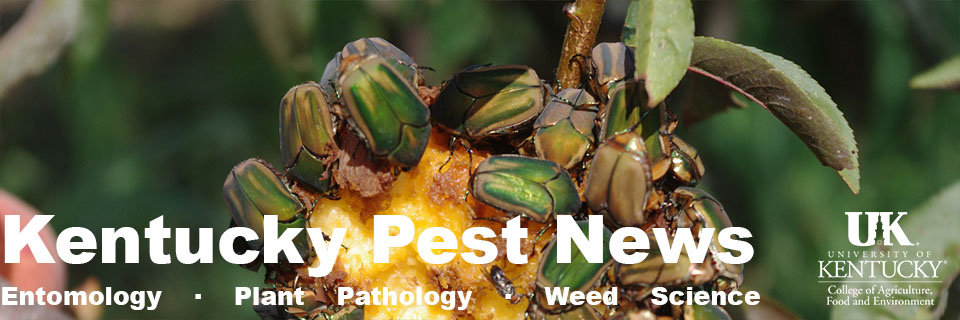Soybean cyst nematode (SCN) is the most damaging pathogen of soybean in Kentucky and across the U.S. This pathogen can cause yield losses even though no above-ground symptoms may be apparent. A three-part webinar series conducted by Dr. Kaitlyn Bissonnette…
Monthly Archives: January 2021
Fruit Rots of Cucurbits (PPFS-VG-07)
Fruit diseases can cause a complete loss of cucurbit yields in commercial fields, as well as in residential gardens. Affected crops in the Cucurbitaceae family include cucumber, muskmelon (cantaloupe), pumpkin, summer squash, winter squash, and watermelon. The major diseases discussed…
Pesticide Training and Certification in Kentucky and Covid-19
Applying pesticides safely and effectively takes training and experience. Applying pesticides improperly can result in risks to one’s health, to food safety, and to the environment. From a regulatory perspective, pesticides are classified as either General Use Pesticides (GUP) or…
Midwest Fruit Pest Management Guide 2021-2022 (ID-232)
The Midwest Fruit Pest Management Guide 2021-2022 was developed by the Midwest Fruit Workers Group, which includes University of Kentucky Extension specialists from Plant Pathology, Entomology, and Horticulture, as well as specialists from twelve other universities. This publication was recently…
Rust Diseases of Brambles (PPFS-FR-S-06)
The three most important rust diseases occurring on brambles in Kentucky are cane and leaf rust, late rust, and orange rust. Distinguishing between these rust diseases is critical for proper management. This new publication discusses symptoms, signs, bramble hosts, causes,…
What’s Wrong with My Taxus? (ID-52)
Taxus (yew) is an evergreen shrub commonly found in Kentucky landscapes. Numerous conditions can cause these shrubs to exhibit yellowing and browning symptoms. Taxus troubles can be the result of diseases, insects, or adverse growing conditions. Pinpointing the specific cause…
